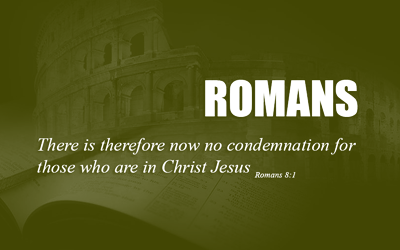Romans 11:1-12:2
A remnant chosen by grace. Grace vs. works. God’s mercy to all. A holy and living sacrifice.
(Bấm vào đây để đọc tiếng Việt)
A REMNANT CHOSEN BY GRACE
 "1So I ask, God has not rejected his people, has he? Absolutely not! For I too am an Israelite, a descendant of Abraham, from the tribe of Benjamin. 2God has not rejected his people whom he foreknew! Do you not know what the scripture says about Elijah, how he pleads with God against Israel? 3“Lord, they have killed your prophets, they have demolished your altars; I alone am left and they are seeking my life!” 4But what was the divine response to him? “I have kept for myself seven thousand people who have not bent the knee to Baal.” 5So in the same way at the present time there is a remnant chosen by grace." (Romans 11:1-5)
"1So I ask, God has not rejected his people, has he? Absolutely not! For I too am an Israelite, a descendant of Abraham, from the tribe of Benjamin. 2God has not rejected his people whom he foreknew! Do you not know what the scripture says about Elijah, how he pleads with God against Israel? 3“Lord, they have killed your prophets, they have demolished your altars; I alone am left and they are seeking my life!” 4But what was the divine response to him? “I have kept for myself seven thousand people who have not bent the knee to Baal.” 5So in the same way at the present time there is a remnant chosen by grace." (Romans 11:1-5)
Did Paul relate to the prophet Elijah in his efforts to bring his people to faith in Christ? In 1 Kings 19, Elijah felt worn out after his confrontation with Baal worship. God encouraged him by revealing that there were still seven thousand individuals who remained faithful and did not bow before Baal. Drawing from this account, Paul drew a parallel between those few individuals and the “remnant chosen by grace.”
Through this comparison between the small group who never worshipped Baal and the “remnant chosen by grace,” Paul highlights the significant consequence of seeking salvation through one’s own works. Just as there were a precious few who did not worship Baal, it is likely that there are also few who approach God through the avenue of grace.
GRACE vs. WORKS
“6And if it is by grace, it is no longer by works, otherwise grace would no longer be grace. 7What then? Israel failed to obtain what it was diligently seeking, but the elect obtained it. The rest were hardened, 8as it is written, “God gave them a spirit of stupor, eyes that would not see and ears that would not hear, to this very day.” 9And David says, “Let their table become a snare and trap, a stumbling block and a retribution for them; 10let their eyes be darkened so that they may not see, and make their backs bend continually.”” (Romans 11:6-10)
No where in else in the Bible does it express more clearly the utter incompatibility of grace and works: “if it is by grace, it is no longer by works, otherwise grace would no longer be grace.” Additionally, by grace alone is anyone chosen for salvation. “Their backs bend continually” because they refuse to let go of the yoke that neither they nor their ancestors can bear.
8And God, who knows the heart, has testified to them by giving them the Holy Spirit just as he did to us, 9and he made no distinction between them and us, cleansing their hearts by faith. 10So now why are you putting God to the test by placing on the neck of the disciples a yoke that neither our ancestors nor we have been able to bear? (Acts 15:8-10)
The cleansing of their hearts is achieved through faith, not by adhering to the works of the law.
GOD’S MERCY TO ALL
“11I ask then, they did not stumble into an irrevocable fall, did they? Absolutely not! But by their transgression salvation has come to the Gentiles, to make Israel jealous. 12Now if their transgression means riches for the world and their defeat means riches for the Gentiles, how much more will their full restoration bring? 13Now I am speaking to you Gentiles. Seeing that I am an apostle to the Gentiles, I magnify my ministry, 14if somehow I could provoke my people to jealousy and save some of them. 15For if their rejection is the reconciliation of the world, what will their acceptance be but life from the dead? 16If the first portion of the dough offered is holy, then the whole batch is holy, and if the root is holy, so too are the branches. 17Now if some of the branches were broken off, and you, a wild olive shoot, were grafted in among them and participated in the richness of the olive root, 18do not boast over the branches. But if you boast, remember that you do not support the root, but the root supports you. 19Then you will say, “The branches were broken off so that I could be grafted in.” 20Granted! They were broken off because of their unbelief, but you stand by faith. Do not be arrogant, but fear! 21For if God did not spare the natural branches, perhaps he will not spare you. 22Notice therefore the kindness and harshness of God – harshness toward those who have fallen, but God’s kindness toward you, provided you continue in his kindness; otherwise you also will be cut off. 23And even they – if they do not continue in their unbelief – will be grafted in, for God is able to graft them in again. 24For if you were cut off from what is by nature a wild olive tree, and grafted, contrary to nature, into a cultivated olive tree, how much more will these natural branches be grafted back into their own olive tree? 25For I do not want you to be ignorant of this mystery, brothers and sisters, so that you may not be conceited: A partial hardening has happened to Israel until the full number of the Gentiles has come in. 26And so all Israel will be saved, as it is written: “The Deliverer will come out of Zion; he will remove ungodliness from Jacob. 27And this is my covenant with them, when I take away their sins.” 28In regard to the gospel they are enemies for your sake, but in regard to election they are dearly loved for the sake of the fathers. 29For the gifts and the call of God are irrevocable. 30Just as you were formerly disobedient to God, but have now received mercy due to their disobedience, 31so they too have now been disobedient in order that, by the mercy shown to you, they too may now receive mercy. 32For God has consigned all people to disobedience so that he may show mercy to them all. 33Oh, the depth of the riches and wisdom and knowledge of God! How unsearchable are his judgments and how unfathomable his ways! 34For who has known the mind of the Lord, or who has been his counselor? 35Or who has first given to God, that God needs to repay him? 36For from him and through him and to him are all things. To him be glory forever! Amen. (Romans 11:11-36)
In this passage from the Bible, the writer emphasizes that the Jewish people’s current stumble and fall is not permanent and cannot be reversed. God still has a plan to restore them and bring them back. Interestingly, the rejection of the Jewish people leads to reconciliation for the entire world.
However, the writer cautions against boasting for both Jews and Gentiles.
Despite currently being at odds with the Gospel for the sake of the Gentiles, the Jewish people are cherished because of God’s choice of their ancestors. The gifts and calling of God are unchangeable, and just as the Gentiles received mercy through the disobedience of the Jewish people, they too can receive mercy through the kindness shown to the Gentiles.
The writer concludes by praising the profound wisdom and knowledge of God, recognizing the incomprehensibility of His judgments and ways. No one can fully comprehend the mind of the Lord or offer counsel to Him. Everything originates from Him, passes through Him, and reaches its fulfillment in Him. He deserves eternal glory.
A HOLY AND LIVING SACRIFICE
“1Therefore I exhort you, brothers and sisters, by the mercies of God, to present your bodies as a sacrifice – alive, holy, and pleasing to God – which is your reasonable service. 2 Do not be conformed to this present world, but be transformed by the renewing of your mind, so that you may test and approve what is the will of God – what is good and well-pleasing and perfect.” (Romans 12:1-2)
In the Old Covenant, it was necessary for a sacrificial animal to undergo a thorough inspection by the priest to ensure it was completely without any defects before it could be offered. However, Jesus became the perfect sacrifice, chosen by God, to atone for the sins of the entire world. So when a believer is encouraged to present themselves as a living and holy sacrifice, what are they supposed to do? They may attempt various approaches they have learned over the years, such as fasting, praying, or abstaining from things that could hinder their efforts.
No matter how hard they try, they will never truly reach a state where they can consider themselves holy and pleasing to God. This worldly approach is common among many religions around the world. So why do believers try to conform to this method of self-sanctification?
Instead, we are called to be transformed by renewing our minds and understanding that through the death of Jesus on the cross, we are already regarded as alive, holy, and pleasing to God. It is not by any of our own attempts to cleanse ourselves that we attain this status. How can a flawed offering possibly make itself flawless? It is through the blood of Christ, not our own efforts, that we find true sanctification.
Nghi Nguyen
- Scripture quoted by permission. All scripture quotations, unless otherwise indicated, are taken from the NET Bible® copyright ©1996-2006 by Biblical Studies Press, L.L.C. All rights reserved.
Disclaimer: This is my own opinion on the topic, which does not necessarily reflect the church's theology, or beliefs of the individuals in it — Nghi Nguyen
